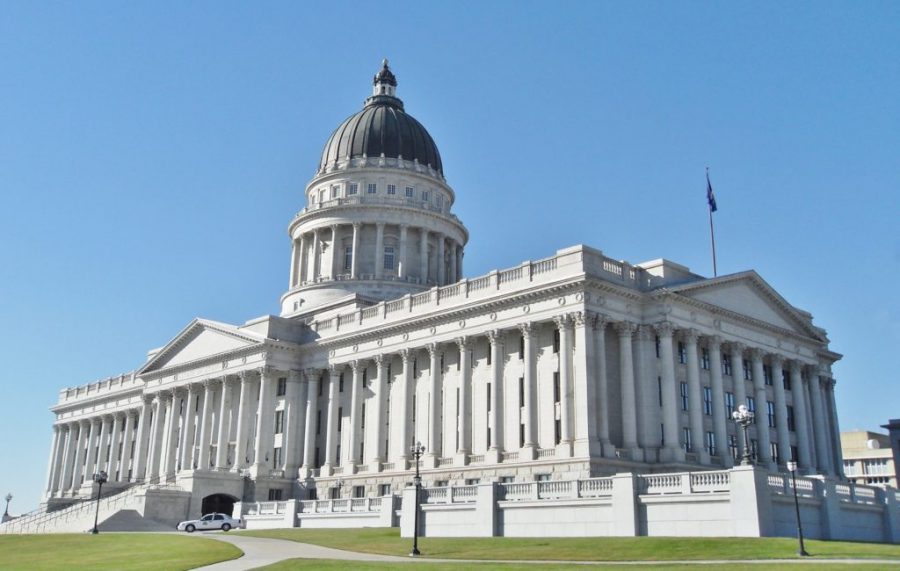On March 18, 2016, what would have otherwise been a normal Friday night in Salt Lake turned out to be anything but. Outside the Salt Lake City and County building, hundreds of people, a half dozen cameras and a single, golden-haired piñata stood in unison in intense anticipation of the arrival of the one and only Donald J. Trump. Trump was scheduled to speak at the Infinity Center down the street later that night. By the time Trump landed in Salt Lake, that crowd, myself included, had grown to more than 1,000 and the entirety of State Street turned into a pedestrian (or protestrian) walkway as police on flashing bikes moved frantically to direct traffic away from the swarm.
“Mr. Hate, not our state!” the protesters chanted. By the end of the night, police in riot gear lined the streets and national media outlets were reporting on the unusual unrest in Salt Lake City. The people of Utah sent a clear message that night: they do not like Donald Trump.
Fast forward some five months later. At his monthly news conference, Gov. Gary Herbert announced he would be voting for the Republican nominee in November. “I am voting for Donald Trump,” Herbert said. “He’s never run for office before, and so he doesn’t have that traditional way of doing things,” adding that that is “part of the appeal.”
Something isn’t right here. The fact that Trump’s appearance caused such a stir in one of the most conservative states in the country speaks volumes about his unpopularity here. It needs to be asked: If Utah has shown such strong contempt for Trump, what justifies our governor’s endorsement?
Maybe Utah dislikes Trump less than I presumed? It doesn’t seem so. According to the Associated Press, Trump received 14.0 percent of the vote at the Utah caucus in March; a Salt Lake Tribune poll in June marked his disapproval among registered voters at 65 percent. As commentators and analysts have noted, Trump has issues appealing to Utah voters and members of the Church of Jesus Christ of Latter-day Saints in particular. Jack Jenkins at The Atlantic argues that Trump’s positions on issues like immigration account for a large portion of the disapproval, citing historical examples of LDS members experiencing religious persecution and intolerance. “For many Utahns, the businessman’s attacks on other religious groups, while popular with some, hedge uncomfortably close to the Mormon faith’s own troubled past,” Jenkins writes.
Gov. Herbert is aware of this troubled past. In a Facebook post back in December, Gov. Herbert wrote that Trump’s proposed ban on Muslim immigration is reminiscent of federal and state government attempts to stop Mormon immigration. “I am the governor of a state that was settled by religious exiles who withstood persecution after persecution, including an extermination order from another state’s governor,” he wrote. “In Utah, the First Amendment still matters.”
Does it still matter, though? Trump’s position on immigration hasn’t changed or lightened since he originally proposed it in December, when he called for a “total and complete shutdown of Muslims entering the United States.” This week he called for “extreme vetting” measures of refugees. Either Gov. Herbert has reconsidered Trump’s immigration proposals or he has chosen to push the issue to the back of his mind.
Not every Utah politician has taken Gov. Herbert’s path. Rep. Mia Love and Rep. Jason Chaffetz both avoided the RNC this year; Utah delegates took to the floor at the convention in a last-ditch effort to stop Trump; Sen. Mike Lee said Trump scares him to death; Republican Lt. Gov. Spencer Cox recently said he had no plans of voting for Trump in November. None of these people have endorsed Trump.
No one has been as outspoken against a Trump presidency as Mitt Romney, who, it is worth noting, received 93.1 percent of the votes in Utah’s primary in 2012. “Donald Trump is a phony, a fraud,” Romney said when he spoke at Kingsbury Hall earlier this year. “He has neither the temperament nor the judgement to be president. And his personal qualities would mean that America would cease to be a shining city on a hill.”
By refusing to vote for or endorse Trump; Romney, Love and others have demonstrated an ability to stick to principles and shown that, for them, ethics and values are not secondary to party politics. Additionally, they have stayed true to the people of Utah by refusing to cast a ballot for a candidate who, for Utahns, evokes memories of religious persecution not all that long ago. Whether he does it for himself or for his constituents, Gov. Herbert should reconsider his endorsement of Trump.
This doesn’t mean, though, that he should necessarily vote for Hillary Clinton, whose unpopularity in Utah is on par with Trump. Perhaps he should vote for a marginal third-party candidate, such as Utah’s own Evan McMullin, or not vote at all. Even if it’s true, as many people argue, that both of these moves would serve as unofficial Clinton votes and ensure her path to the presidency, at least our governor would avoid voting for a candidate he has previously spoken so strongly against.


